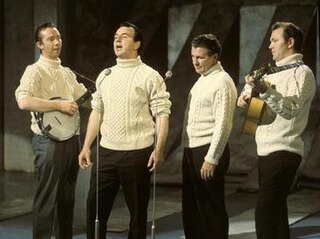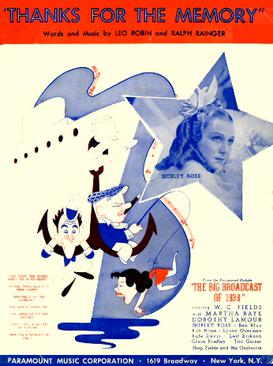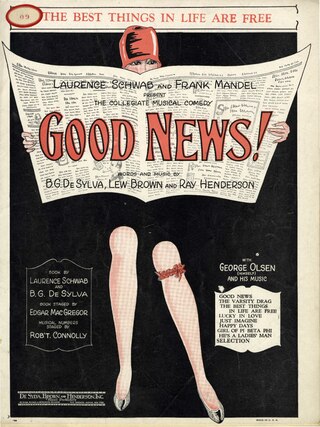Related Research Articles

Edward Neil Anthony Hannon is a singer and songwriter from Northern Ireland. He is the founder and frontman of the chamber pop group the Divine Comedy, and is the band's only constant member since its inception in 1989. Hannon wrote the theme tunes for the television sitcoms Father Ted and The IT Crowd, as well as the original songs for the musical film Wonka (2023).

"Over the Rainbow", also known as "Somewhere Over the Rainbow", is a ballad by Harold Arlen with lyrics by Yip Harburg. It was written for the 1939 film The Wizard of Oz, in which it was sung by actress Judy Garland in her starring role as Dorothy Gale. It won the Academy Award for Best Original Song and became Garland's signature song.

The Clancy Brothers were an influential Irish folk music group that developed initially as a part of the American folk music revival. Most popular during the 1960s, they were famed for their Aran jumpers and are widely credited with popularising Irish traditional music in the United States and revitalising it in Ireland, contributing to an Irish folk boom with groups like the Dubliners and the Wolfe Tones.

"Don't Dilly Dally on the Way", subtitled "The Cock Linnet Song" and often credited as "My Old Man ", is a music hall song written in 1919 by Fred W. Leigh and Charles Collins, made popular by Marie Lloyd.

Liam Clancy was an Irish folk singer from Carrick-on-Suir, County Tipperary. He was the youngest member of the influential folk group the Clancy Brothers, regarded as Ireland's first pop stars. They achieved global sales of millions and appeared in sold-out concerts at such prominent venues as Carnegie Hall and the Royal Albert Hall.

"Danny Boy" is a song with lyrics written by English lawyer Frederic Weatherly in 1910, and set to the traditional Irish melody of "Londonderry Air" in 1913.

"The Teddy Bears' Picnic" is a song consisting of a melody written in 1907 by American composer John Walter Bratton, and lyrics added in 1932 by Irish songwriter Jimmy Kennedy. It remains popular in Ireland and the United Kingdom as a children's song, having been recorded by numerous artists over the decades. Kennedy lived at Staplegrove Elm and is buried in Staplegrove Church, in Taunton, Somerset, England. Local folklore has it that the small wooded area between the church and Staplegrove Scout Hut was the inspiration for his lyrics.
"The Patriot Game" is an Irish ballad with lyrics by Dominic Behan and a melody from the traditional tune "One Morning in May", first released in 1958.
"Streets of Laredo", also known as "The Dying Cowboy", is a famous American cowboy ballad in which a dying ranger tells his story to another cowboy. Members of the Western Writers of America chose it as one of the Top 100 Western songs of all time.
"Johnny I Hardly Knew Ye", also known as "Johnny We Hardly Knew Ye" or "Johnny I Hardly Knew Ya", is a popular traditional song, sung to the same tune as "When Johnny Comes Marching Home". First published in London in 1867 and written by Joseph B. Geoghegan, a prolific English songwriter and successful music hall figure, it remained popular in Britain and Ireland and the United States into the early years of the 20th century. The song was recorded by The Clancy Brothers & Tommy Makem on their eponymous album in 1961, leading to a renewal of its popularity.
"The Parting Glass" is a Scottish traditional song, often sung at the end of a gathering of friends. It has also long been sung in Ireland, where it remains popular; this has strongly influenced how it is often sung today. It was purportedly the most popular parting song sung in Scotland before Robert Burns wrote "Auld Lang Syne".

"Thanks for the Memory" (1938) is a popular song composed by Ralph Rainger with lyrics by Leo Robin. It was introduced in the 1938 film The Big Broadcast of 1938 by Bob Hope and Shirley Ross, and recorded by Shep Fields and His Orchestra featuring John Serry Sr. on accordion in the film and vocals by Bob Goday on Bluebird Records. Dorothy Lamour's solo recording of the song was also popular, and has led to many mistakenly believing over the years that it was she who sang the tune with Hope in the film.
"(The) Leaving of Liverpool", also known as "Fare Thee Well, My Own True Love", is a folk song. Folklorists classify it as a lyrical lament and it was also used as a sea shanty, especially at the capstan. It is very well known in Britain, Ireland, and America, despite the fact that it was collected only twice, from the Americans Richard Maitland and Captain Patrick Tayluer. It was collected from both singers by William Main Doerflinger, an American folk song collector particularly associated with sea songs in New York. The song's narrator laments his long sailing trip to California and the thought of leaving his loved ones, pledging to return to her one day.

"I Could Have Danced All Night" is a song from the musical My Fair Lady, with music written by Frederick Loewe and lyrics by Alan Jay Lerner, published in 1956. The song is sung by the musical's heroine, Eliza Doolittle, expressing her exhilaration and excitement after an impromptu dance with her tutor, Henry Higgins, in the small hours of the morning. In a counterpoint during the second of 3 rounds, two maids and the housekeeper, Mrs. Pearce, urge Eliza to go to bed, but she ignores them.

"Hard Times Come Again No More" is an American parlor song written by Stephen Foster. It was published in New York City by Firth, Pond & Co. in 1854 as Foster's Melodies No. 28. Well-known and popular in its day, both in the United States and Europe, the song asks the fortunate to consider the plight of the less fortunate and includes one of Foster's favorite images: "a pale drooping maiden".
"I Dreamed a Dream" is a song from the 1980 musical Les Misérables. It is a solo that is sung by Fantine during the first act. The music is by Claude-Michel Schönberg, with orchestrations by John Cameron. The English lyrics are by Herbert Kretzmer, based on the original French libretto by Alain Boublil and Jean-Marc Natel from the original French production.

"Papa, Can You Hear Me?" is a 1983 song composed by Michel Legrand with lyrics by Alan Bergman and Marilyn Bergman, for Barbra Streisand in the title role of Yentl. The song was nominated for Best Original Song at the 56th Academy Awards; Streisand's longtime friend Donna Summer performed it during the ceremonies. The song peaked at No.26 at Billboard's Adult Contemporary.

The Steampunk Album That Cannot Be Named for Legal Reasons, originally known as Now That's What I Call Steampunk! Volume 1, is the first album by the English steampunk band The Men That Will Not Be Blamed for Nothing. The album was released by Leather Apron on CD and digital download and as a limited edition set containing one track on a phonographic wax cylinder. It is the first time a musical track has been released commercially as a wax cylinder in Britain since 1922. The album was renamed in January 2012, after EMI gave the band three days to change the title or face legal action.

Robbie O'Connell is an Irish singer songwriter who performs solo, as well as with The Green Fields of America. He also appears with Dónal Clancy (cousin), Dan Milner, and fiddler Rose Clancy. O'Connell has also toured and recorded with The Clancy Brothers, being their nephew. For over 20 years, he has conducted small cultural tours to Ireland with Celtica Music & Tours and, for more than ten years, WGBH Learning Tours. Married with four grown children, he now spends his time between Bristol, Rhode Island and Waterford.

"The Best Things in Life Are Free" is a popular song written by the songwriting team of Buddy DeSylva and Lew Brown (lyrics) and Ray Henderson (music) for the 1927 musical Good News. It enjoyed a revival during the period from 1947 to 1950, when it was covered by many artists.
References
- 1 2 "They're moving father's grave to build a sewer". Folk Song and Music Hall. 2024-01-15. Retrieved 2024-11-20.
- ↑ Clancy Brothers. "They're moving Father's grave to build a sewer".
- ↑ "Tech Know: A journey into sound". BBC. 27 May 2010. Retrieved 27 May 2010.